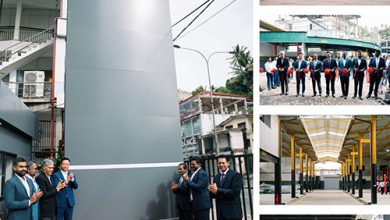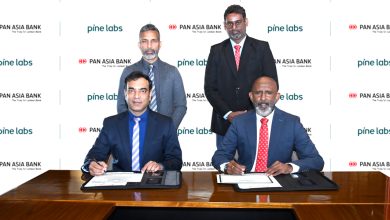DFCC BANK
Financial Stability: Prudent Balance Sheet Management results in strong bottom line growth for DFCC Bank
- Group Net Operating Income up by 22% to LKR 24 Bn
- Impairment charge for loans and receivables reduced by 69% to LKR 3.6 Bn.
- Group Profit After Tax of LKR 7.1 Bn
- Group Total Capital Adequacy Ratio – 15.242%
- Group Total Assets up by 6% to LKR 681 Bn

During the period under review, DFCC Bank has continued to record a strong financial performance, reflecting the entity’s growth and stability amid the ongoing economic recovery. Market lending interest rates continued to decline in line with the current accommodative monetary policy stance, with the expectation that credit expansion to the private sector is expected to continue, supported by lower market lending interest rates. The Bank has continued to reduce lending rates in line with the prevailing accommodative monetary policy stance, and consequently, the loan portfolio of the Bank has grown by 10% to LKR 383 Bn as of 30 September 2024.
Further, the Bank issued Sri Lanka’s first ever listed and rated Green Bond, which was significantly oversubscribed during the period under review. This achievement is a testament to the trust and confidence that the Bank’s valued investors and stakeholders have placed in DFCC Bank and its commitment to sustainability.
The following commentary relates to the unaudited Financial Statements for the period ended 30 September 2024, presented in accordance with Sri Lanka Accounting Standard 34 (LKAS 34) on “Interim Financial Statements.”
Financial Performance
Profitability
DFCC Bank PLC, the largest entity within the Group, reported a Profit Before Tax (PBT) of LKR 9,559 Mn and a Profit After Tax (PAT) of LKR 6,013 Mn for the period ended 30 September 2024 compared with the previous period’s PBT of LKR 8,305 Mn and a PAT of LKR 5,498 Mn. The Group recorded a PBT of LKR 9,909 Mn and PAT of LKR 7,128 Mn for the period ended 30 September 2024 as compared to LKR 8,681 Mn and LKR 7,064 Mn, respectively, in 2023. The Bank’s Return on Equity (ROE) improved to 10.82% during the period ended 30 September 2024 from 12.19% recorded for the year ended 31 December 2023. The Bank’s Return on Assets (ROA) before tax for the period ended 30 September 2024 is 1.86% compared to 1.82% for the year ended 31 December 2023. The Bank’s total tax expense, which includes Value Added Tax (VAT) and Social Security Contribution Levy (SSCL) on financial services and Income Tax, is LKR 6,550 Mn for the period ending 30 September 2024. As a result, the Bank’s tax expense as a percentage of operating profit for the period stood at 52.14%.
Net Interest Income
The Bank has continued to make downward adjustments to lending and deposit rates to align with the current accommodative monetary policy stance of the Central Bank of Sri Lanka to expand credit to the private sector. Lower market lending interest rates and the anticipated recovery in domestic economic activity are expected to continue supporting this expansion, thus supporting the envisaged rebound of the economy. The lower interest rates have resulted in reduced interest income and expenses compared to the comparable period of 2023. The Bank’s Net Interest Income (NII), its core business, decreased by 12% to reach LKR 20,734 Mn by the end of September 2024.The interest margin decreased from 5.18% in December 2023 to 4.20% by September 2024.
Despite the sharp reduction in lending rates, the bank was able to partially safeguard its Net Interest Income (NII) by investing in longer-term, fixed-rate instruments from the beginning of the year.
Fee and Commission Income
The untiring efforts of the Bank’s staff led to increased credit card-related operations, which mainly contributed to an increase in fee and commission income compared to the comparable period of 2023. In line with the objective of expanding credit card operations and acquiring new businesses, fee expenses relating to credit cards also increased. By providing a positive net effect as a return to expanding the credit card operation, net fee and commission income have increased by 8% to LKR 3,068 Mn for the period ended 30 September 2024, compared to LKR 2,848 Mn for the comparative period in 2023.
Net Gains from De-recognition of Financial Assets
The Bank has disposed a portion of its Sri Lankan government securities classified under FVOCI, resulting in a gain of LKR 2,383 Mn, underscoring the efficacy of its strategic decisions. Conversely, the sale of a part of the Bank’s International Sovereign Bond (ISB) holdings incurred a loss of LKR 2,172 Mn. However, this was offset by the reversal of the impairment provision for same of LKR 2,453 Mn on the disposal of ISB, which positively impacted the overall income statement for the period.
Impairment Charge on Loans and Other Losses
The impaired loan (stage 3) ratio decreased from 7.03% in December 2023 to 6.01% as of 30 September 2024 due to significant growth in the portfolio, in line with positive developments in the macroeconomic environment, coupled with the Bank’s concerted efforts in recoveries. To address the current and potential future impact of the present economic conditions on the lending portfolio, the Bank made adequate impairment provisions during the period by continuing to calibrate internal models to account for unseen risk factors in the future, including additional provisions made for the Bank’s exposure to risk-elevated sectors.
Accordingly, reflecting positive macroeconomic indicators and the Bank’s concerted efforts on recoveries, the impairment charges for loans and advances improved significantly to LKR 3,577 Mn for the period ended 30 September 2024, compared to LKR 11,525 Mn in the comparable period.
Operating Expenses
Operating expenses for the period ended 30 September 2024 increased to LKR 10,848 Mn compared with LKR 8,370 Mn during the corresponding period in 2023, primarily due to the increase in inflation and the adjustment to staff benefits. However, the Bank has taken numerous cost control measures, resulting in operating expenses being managed at these levels.
Other Comprehensive Income (OCI)
Changes in the fair value of investments in equity securities and fixed-income securities (treasury bills and bonds) and movement in hedging reserves are recorded through other comprehensive income. Due to the application of hedge accounting, the impact on the Bank’s total equity due to exchange rate fluctuation was minimised. A net fair value gain of LKR 1,797 Mn was recorded on account of equity securities as of 30 September 2024. The increase in the share price of Commercial Bank of Ceylon PLC during the period was the main contributor to the reported fair value gain in equity securities. The favourable movement in treasury bills and bond yields also resulted in a fair value gain of LKR 944 Mn.
Business Growth
Assets
The DFCC Bank’s total assets increased by LKR 35 Bn, recording a growth of 6% from December 2023. In line with the Bank’s growth strategy and the current economy, an increase in investment in fixed-income securities has contributed to a 50% increase in investment in financial assets at an amortized cost of LKR 102 Bn as at 30 September 2024, compared to the balance as of 31 December 2023. Further, The Bank’s net loan portfolio growth of LKR 34 Bn to LKR 383 Bn compared to LKR 349 Bn as at 31 December 2023, an increase of 10%, contributed to the asset growth during the period. Moreover, the Bank has designated its joint venture investment as an asset held for sale in light of its strategic decision to seek avenues to divest its 50% ownership in Acuity Partners Private Limited.
Liabilities
The DFCC Bank’s total liabilities increased by LKR 30 Bn, recording an increase of 5% from December 2023. This is mainly due to the Bank’s deposit base experiencing a growth of 8% during the period, recording an increase of LKR 33 Bn to LKR 440 Bn, up from LKR 407 Bn as at 31 December 2023. Further, the CASA ratio was 25.82% as at 30 September 2024. The Bank’s funding costs include medium to long-term concessionary credit lines, primarily used to grow the lending portfolio and provide much-needed concessionary funding to our customers. Considering these concessionary term borrowings, the CASA ratio improved to 33.33%, and the loans-to-deposit ratio improved to 82.30% as at 30 September 2024.
Equity and Compliance with Capital Requirements
DFCC Bank’s total equity increased to LKR 73.3 Bn as at 30 September 2024, supported by favourable movements in the equity portfolio and fixed income security portfolio classified as fair value through other comprehensive income, and positive movements in the hedging reserve, together with the recorded profit after tax of LKR 6 Bn. Accordingly, Tier 1 and Total Capital ratios were recorded at 10.708% and 14.358% by 30 September 2024, compared to 11.490% and 13.511%, respectively, as at 31 December 2023. The Bank’s Net Stable Funding Ratio (NSFR) was 121.54%, and Liquidity Coverage Ratio (LCR) – all currency – was 271.46% as at 30 September 2024, compared to 124.60% and 597.47% respectively, as at 31 December 2023. All these ratios were thus maintained well above the minimum regulatory requirement.
CEO’s Statement
In Q3 2024, DFCC Bank continued to demonstrate resilience and growth amidst a dynamic market, achieving strong asset growth and maintaining financial stability. With a 22% increase in Group Net Operating Income and a substantial 69% reduction in impairment charges, we have successfully managed to maintain the bank’s profitability by effectively managing impairments and optimizing our interest income and fee income strategy. Our focus remains on enhancing customer experience through digital solutions, contributing to a stronger fee and commission income. This quarter’s major milestone was the issuance of Sri Lanka’s first listed and rated Green Bond, underscoring our commitment to sustainability and the trust our stakeholders place in us. We remain focused on prudent risk management and innovative banking solutions to drive sustainable growth.
Thimal Perera
Director/Chief Executive Officer
13th November 2024





